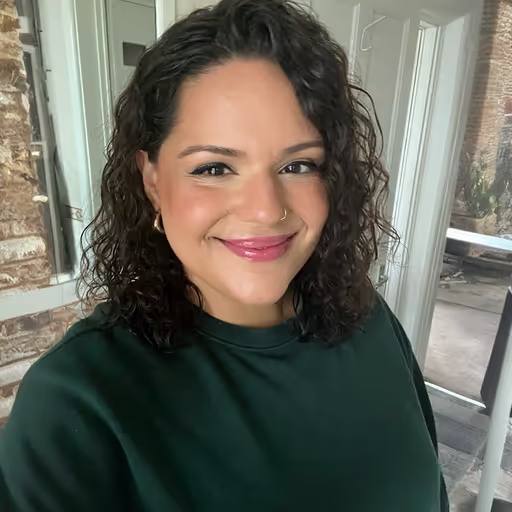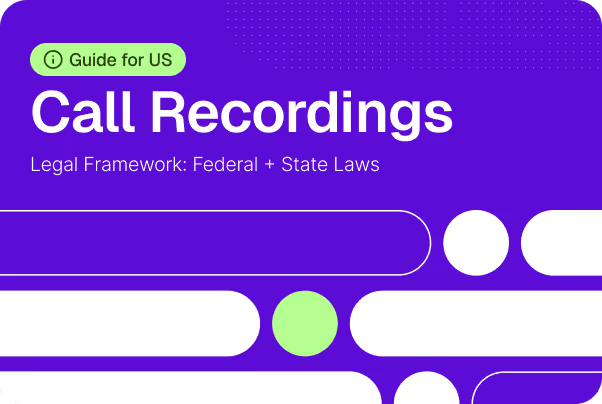Call recording is a routine business practice—but in the United States, it exists at the intersection of federal wiretapping law, state-specific consent rules, and cross-border compliance risks.
If your business handles calls across multiple states or operates AI voice agents that log interactions, it’s critical to understand how U.S. laws govern phone call recordings—not just whether consent is required, but whose consent, and under what conditions.
This article focuses on the legal framework behind call recording in the U.S., clarifying key differences between federal and state laws, and the implications for companies that operate nationally or use AI-driven phone systems.
Federal Law: Recording is Permitted with One-Party Consent
At the federal level, the Wiretap Act (18 U.S.C. § 2511) permits phone call recording as long as one party to the conversation consents.
That means if a business employee (or AI system acting on its behalf) is a participant in the call, the business doesn’t need to notify the other party—as far as federal law is concerned.
However, federal law sets only the minimum standard. States can—and do—impose stricter rules.
State Laws: A Patchwork of Consent Requirements
There is no single national policy governing phone recording consent. Instead, each state enacts its own laws—falling into two broad categories:
One-Party Consent States
In the majority of states, only one participant must consent. If your business operates entirely in these states, and your employee or AI agent is part of the call, recording is generally allowed without additional notice.
Common one-party states include:
- New York
- Texas
- North Carolina
- Indiana
- Arizona
- Georgia
- Ohio
Two-Party (All-Party) Consent States
Twelve U.S. states require all participants to be informed the call is being recorded. This includes:
- California
- Connecticut
- Florida (in civil matters)
- Maryland
- Massachusetts
- Nevada
- New Hampshire
- Pennsylvania
- Washington
- Montana
- Illinois (in some contexts)
- Michigan (legally disputed)
Link: See full state breakdown →
What If a Call Crosses State Lines?
Here’s where things get legally complex. If your business calls from a one-party consent state into a two-party consent state, which law applies?
There’s no definitive federal precedent, and courts have ruled differently based on:
- Where the company is located
- Where the caller is located
- Whether the recording took place in one or both states
- Whether the call was outbound or inbound
Best practice:
Always follow the stricter state law when dealing with interstate calls. If the person you’re calling is in a two-party state, disclose the recording—regardless of your company’s location.
What About AI Voice Agents?
AI voice systems like Synthflow often include recording by default. That raises two compliance considerations:
- Consent Requirements Still Apply: Whether the call is handled by a human or an AI agent, state consent laws don’t change.
- Disclosure Must Be Automated: AI agents should start each call with a recording notice, especially when interacting with callers across multiple states.
Example:
“This call may be recorded for quality and training purposes.”
This statement ensures compliance in most two-party states and is standard in enterprise voice operations.
Compliance Considerations for U.S. Businesses
Whether you're operating call centers, voice AI, or BPO services, staying compliant requires more than just checking your home state’s laws.
Best Practices:
- Always disclose call recording across all customer-facing calls
- Train staff and configure systems to deliver verbal disclaimers automatically
- Use location detection or tagging to adjust disclaimers for two-party states
- Store recordings securely using encryption and access control
- Maintain audit trails for regulatory or legal inquiries
- Consult legal counsel if your operations span multiple states or jurisdictions
International Implications
If you conduct business outside the U.S., local privacy laws may require:
- Explicit consent (e.g., GDPR in the EU)
- Clear disclosure of recording purpose
- Data residency and retention restrictions
Your privacy policy and AI platform should support localized compliance features, especially for multi-country deployments.
Summary: Is It Legal to Record Phone Calls in the U.S.?
Yes—if you follow the rules.
- Federal law permits recording with one-party consent
- 12 states require all-party consent, even for businesses
- Interstate and international calls add complexity
- AI systems are not exempt from disclosure requirements
When in doubt, adopt a disclosure-first policy and configure your call systems (human or AI) accordingly.
Stay compliant while unlocking the value of recorded conversations. See how Synthflow helps enterprises manage call recording legally and securely. Book a demo today.
Disclaimer: This article is for educational purposes only and does not constitute legal advice. Consult qualified legal counsel regarding your business’s specific compliance obligations.






